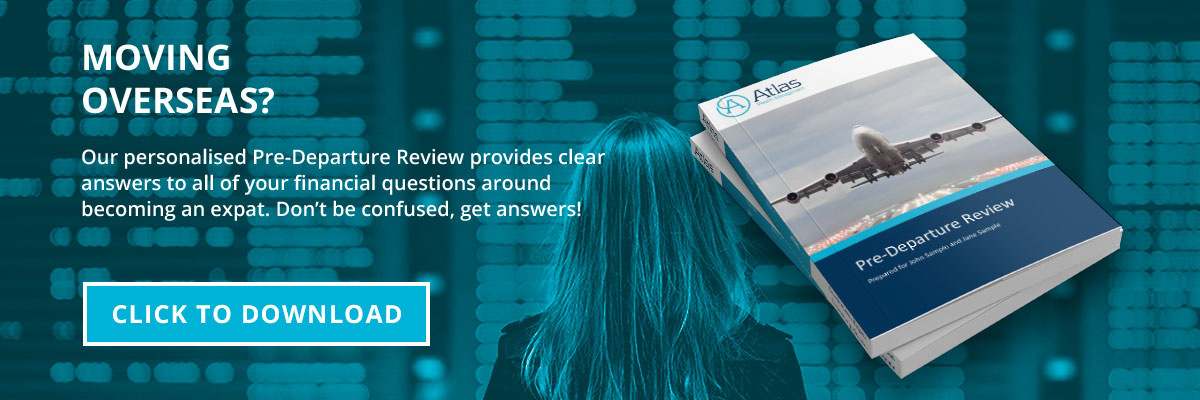Moving Overseas? Can You Answer These 5 Questions? – it is a exciting time moving overseas and becoming an expat however too many people board the plane without understanding how moving overseas and becoming an Australian expat will affect their finances.
Don’t leave Australia to work overseas before you are able to answer these 5 Questions about moving overseas as a expat.
Will your property investment strategy still work?
Property investment strategies centered around high levels of gearing and property investment probably won’t do much for you. The reason is as a nonresident you are treated no differently to any other foreign investor of Australian property and there no longer a main residence exemption unless you satisfy the Life events test.
If you meet these criteria and the normal eligibility to claim a principal place of residence capital gains exemption you can use the exemption to vary the capital gains withholding that would otherwise apply.
For investment properties non-residents are subject to the same State Government taxes designed to subdue demand from overseas buyers. And when you sell potentially very high rates of Capital Gains Tax.
Australian residents enjoy a 50% discount on Gains and even if you were a resident for part of the ownership period you may still pay tax on the whole gain.
Will your share investment strategy still work?
For Australian expats shares, managed funds and ETF’s are more appealing partly due to the different way these assets are treated for tax in Australia, and the rapid increase in digital technology that enables you to manage and monitor your investment portfolio.
Shares and Managed Account are not treated as taxable Australian Property and as such do not accrue capital gains tax with the ATO whilst you are a nonresident for tax purposes.
The second benefit is the ability to use franking credits to offset any non-resident withholding tax that may accrue on the dividends.
The third benefit of owning shares as an expat is liquidity. Liquidity is a key aspect of expat lives and we are constantly working with clients to manage funding gaps, whether it is for business or personal reasons.
Will your current adviser still be able to help advise you?
Due to compliance and regulatory complexities a lot of Australian firms are not interested in advising overseas clients.
This could mean that your current advisor can no longer serve you once you are overseas. Check with your financial service providers before you go, rather than be surprised later when your options are much more limited.
There is a benefit to using financial advisers with an overseas focus because they will have already seen most issues that face Australian expats.
How Will Your New Country Treat and Tax Your Current Investment Accounts?
Each country has its own tax laws and how your new country of residence will tax your Australian sourced income and retirement accounts may be quite different than the ATO.
For example, superannuation is a great way to save for retirement and avoid future taxation in retirement, but the low ongoing taxes and the tax-free pensions are not recognized in many countries.
For example, the USA will include Superannuation returns as taxable income in the year the returns accrue.
On the other hand, the UK and France recognize the nature of Superannuation accounts under the terms of their double taxation treaties with Australia, but the French still consider Pension Income as taxable.
Have you effectively left Australia and assumed nonresident tax status?
Until the Australian Parliament passes the legislation around the adoption of the new tax residency rules announced in the 2021/22 budget, the existing less prescriptive rules continue to apply.
Make sure you do the minimum such as advise Medicare, suspend your health insurance, take yourself off the electoral role, tell the ATO etc. etc.
If you are not sure talk to your accountant or at least talk to us. There can be nothing worse than getting a notice 5 years down the track from the ATO demanding back taxes.
Will your Estate Planning work as have intended?
Estate planning is a key component of cross-border wealth management. Just as every country has its own unique tax laws, every country establishes its own unique set of estate and inheritance laws and probate procedures.
Even a simple will may fail to distribute your assets as you wish if its stipulations conflict with your new country’s succession laws.
Discretionary Trusts and the inclusion of Testamentary Trusts may inadvertently turn your estate planning into a complicated nightmare, and they may create unintended consequences in many countries.
For example, a lot of countries treat inheritance via a trust structure as coming from a third party and subject to a higher tax rate than if it came directly from a relative.
Another potential risk is that your new country completely ignores your trust structures and your wishes.
Even the UK – a country with a long tradition of using trusts – applies punitive taxes to trusts depending on how they are structured.
Much of the world has strict succession legislation rules and high estate or inheritance tax rates. Before you leave the Australia ensure that your estate plan does not make an already difficult situation even worse for your loved ones.
These five questions are simply the beginning of a sometimes-complex process, but they are important considerations as you start your overseas adventure on the right foot.
Please contact us to discuss your unique situation.
At Atlas Wealth Management we pride ourselves on assisting Aussie expats navigate the tricky waters of cross-border wealth management.

